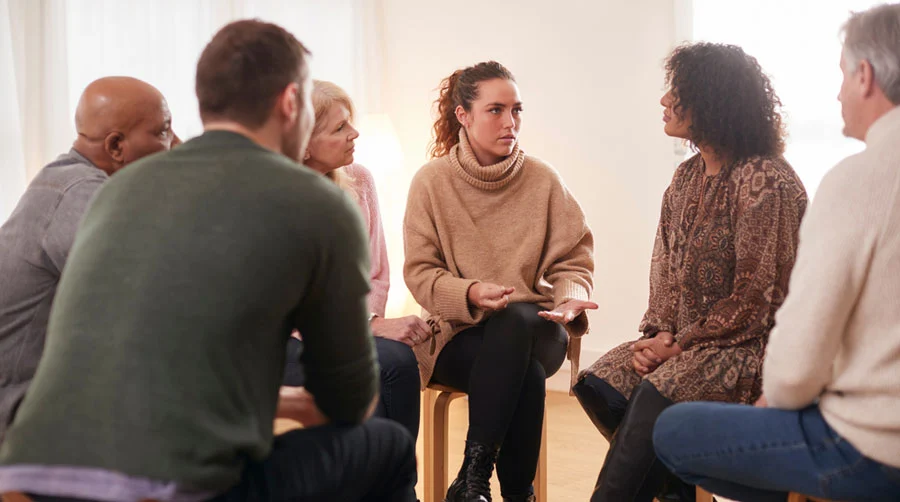Get Help for Post Traumatic Stress Disorder at South Shores
It is normal to feel restless, anxious, or even depressed after experiencing a traumatic event. This is a natural response to high levels of stress. Your symptoms can make it hard to focus at work and home, cause relationship struggles, and even make you feel depressed.
But when should you reach out for PTSD treatment Orange County services and support?
Post traumatic stress disorder (PTSD) is usually diagnosed after 3-6 months after a traumatic event of ongoing symptoms that don’t fade. When you develop PTSD, it causes disruptions in your everyday life. You may not feel comfortable and experience panic attacks or flashbacks when startled. It can also cause you to distance yourself from the people you love.
Fortunately, with proper mental health treatment, you can start to heal.
At South Shores, we tailor individualized treatment plans to your specific needs. We offer plans focused on your trauma, rather than a one-size-fits-all approach. Our evidence-based therapies and approaches to treatment can put you back in the driver’s seat of your life.
Post Traumatic Stress Disorder (PTSD) Symptoms

PTSD is a mental health disorder commonly experienced after a traumatic event. These symptoms last several weeks or months. When they last longer, you may be diagnosed with post-traumatic stress disorder. Here’s a closer look at symptoms you may experience.
Mood and Cognition
After a traumatic event, negative thoughts and challenging feelings are common. Restlessness and racing thoughts can make it hard to sleep, while constantly feeling on edge or depressed about the world that you live in can take a serious toll. Other people experience emotional numbness, which also has negative consequences for mental health.
Arousal
Emotional reactions like feeling on edge or constantly alert are common with PTSD. Heightened arousal causes difficulties with sleeping and concentrating. You may be easily startled.
These symptoms are caused by your mind having a hard time resting because you stay vigilant and watchful for dangers. This constant state of arousal can also make you irritable.
Symptoms Directly Related to Trauma
Traumatic symptoms often present as either avoidance or reliving the event. You might consciously or unconsciously avoid thoughts, people, and places that remind you of trauma. This can create feelings of detachment or numbness. Some people also cannot remember details of what happened.
Others cannot avoid reminders of the event. They may struggle with flashbacks, nightmares, or intense physical symptoms like sweating and a racing heart when faced with intrusive memories or triggers.
Emotional Symptoms
Many people experience negative thoughts and feelings related to traumatic events. Even when you played no role in the event, you may feel guilty, ashamed, or damaged. It’s also possible to have strong negative feelings about the safety of the world around you.
Some people also struggle with other mental health conditions after witnessing or experiencing a traumatic event. This might include anxiety, depression, insomnia, eating disorders, or mood disorders. Suicidal thoughts, attempts, and self-destructive behaviors are also common.
What Causes PTSD?
You can develop PTSD after any event that causes severe stress. For example, a severe car accident, physical or sexual assault, natural disaster, severe mental or physical harm, and involvement in war have the potential to cause PTSD.
Post-traumatic stress disorder is most likely if you experience intense helplessness, sexual or physical assault, or something that you believe would never happen to you. People who have past trauma are also more likely to develop this condition.
When trauma is prolonged or happens in childhood, complex PTSD (complex trauma) may develop. This is a separate mental health condition.
Choose Beautiful Dana Point for PTSD Treatment in Orange County
People struggling with PTSD are constantly on alert, making it hard to relax. South Shores is located near San Juan Capistrano and Dana Point, California. Our facility is peaceful, with views of the beach. Residential clients are also encouraged to spend time on the beach as part of treatment, with activities like surf therapy, meditation, and yoga.
Studies show the benefits of spending time in nature for people with PTSD. Exploring California beaches, national parks, and gardens in the area is a great way to improve mood, relieve anxiety, and improve your general sense of well-being.
Find Treatment of a Higher Standard at South Shores
South Shores is also Joint Commission Accredited, a certification that speaks to our treatment facility’s high level of care. We offer help with PTSD across all levels of treatment, including inpatient, outpatient, and dual-diagnosis care.
Convenient PTSD Treatment in Orange County, California
Our convenient location in Dana Point also makes treatment accessible for those seeking treatment in Orange County and the surrounding areas. We service residents of Anaheim, Newport Beach, Santa Ana, Buena Park, Westminster, and more!
Elements of PTSD Treatment
Inpatient treatment is often reserved for severe cases of PTSD. You may be experiencing symptoms like depression, paranoia, angry outbursts, or other extreme reactions to memories, emotions, and stimuli. Residential treatment may also be recommended if you are struggling with trauma disorder in addition to substance use disorder.
During residential treatment, you’ll work closely with mental health professionals in individual and group therapy. Clients are also encouraged to participate in physical activities like yoga and surf therapy while establishing structure, routines, and emotional support that promote recovery. When appropriate, medications may also be prescribed to alleviate PTSD symptoms.
Intensive outpatient programs (IOP) and partial hospitalization programs can also be helpful. During these programs, you’ll spend several hours at our Orange County, CA facility working with individual and group therapists. Following intensive treatment, most people continue seeing mental health professionals when necessary.
Can Medication Help with PTSD?
No medication can take away the memories of traumatic experiences. However, PTSD sometimes presents with symptoms like depression, anxiety disorders, or sleep disturbances that can be treated.
Antidepressants, anti-anxiety medication, mood stabilizers, and sleep medications may be prescribed to manage symptoms. They can treat an underlying mental health issue or symptoms caused by traumatic experiences.
Close supervision and medication management is important until you know what works. During depression treatment, for example, antidepressants sometimes cause suicidal ideation and put you at an increased risk of harming yourself.
Dual Diagnosis for Co-Occurring Addiction and Mental Disorders
Sometimes, people who experience trauma turn to drugs or alcohol to numb their feelings or escape from reality. When you turn to substances for relief when you experience symptoms, it can quickly become a habit. Over time, you’ll develop a dependence on drugs or alcohol that turns into addiction.
Dual diagnosis programs are most effective for co-occurring substance use and mental health disorders. These conditions commonly occur together because addiction and mental illness share the same risk factors. Unresolved trauma can also contribute to substance use disorders while using drugs or alcohol can make PTSD symptoms worse.
At South Shores, you’ll work with an experienced team familiar with substance abuse, PTSD, and the connection between the two. By addressing both disorders during PTSD treatment in Orange County, California, there’s a better chance of long-term recovery.
Evidence-Based Therapies for PTSD
Mental health treatment and talk therapy work best for long-term relief from PTSD. Goal-oriented therapy helps you gain insight into what happened and how to stop negative physical and emotional responses.
There are several evidence-based therapies considered effective for treating post-traumatic stress disorder (PTSD) with the right encouragement. Family therapy may also be considered.
With the intensity of some trauma-focused therapies, it’s important to work with a mental health professional you trust.
Trauma-Focused Cognitive Behavioral Therapy
Cognitive behavioral therapy invites you to look at mental processes and the relationship between thoughts, emotions, and reactions. This effective PTSD treatment plan is customized to your traumatic memories. It teaches you to evaluate negative or unhelpful thoughts and ultimately change thinking patterns.
Stress Inoculation Training
During stress inoculation training, you’ll learn how to manage stress and symptoms caused by reactions to stimuli that remind you of the accident. Breathing and massage techniques are commonly used. This type of therapy may be recommended in an individual or group therapy setting.
Prolonged Exposure Therapy
Prolonged exposure therapy is similar to CPT in some aspects, and offers a form of of talk therapy that works best for people struggling with nightmares or flashbacks. During exposure therapy, you visualize or talk about the traumatic event.
This teaches you to cope in a safe environment. This is similar to cognitive processing therapy, where you’ll visualize, think about, and talk about what happened until it causes less emotional distress.
Eye Movement Desensitization and Reprocessing
Eye movement desensitization and reprocessing (EMDR) therapy starts with encouraging specific eye movements while remembering details of traumatic events. Then, these eye movements and other stimuli are used to reprogram the brain.
Find PTSD Treatment in Orange County at South Shores
You deserve to spend your life doing more than focusing on surviving. At South Shores, we use a holistic, evidence-based approach to healing that will help you overcome past trauma and its effects in a supportive environment. You’ll work with a specialist to set goals and develop an effective treatment plan.
Trauma has controlled enough of your life – reach out to today. South Shores can help you gain control of your life. We can verify insurance, discuss treatment options, or set up a tour of our California facility over the phone.



